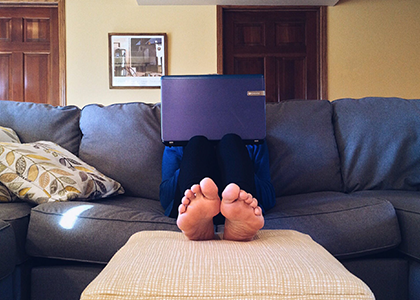By: Neal M. Albritton, Lead Advisor & Joy-Bringer
If you started reading this thinking it was about computer viruses, think again! With the flu season and the impending doom we’re hearing about with the novel coronavirus bearing down on the US, the average American may start taking preventative care measures not normally seen in this country including wearing facemasks, canceling school and work to prevent the spread of disease, and rescheduling trips.
As the country attempts to navigate how best to approach a pandemic, one constant remains true: limiting exposure limits your risk. What experts call “social distancing” may sound like extreme isolation tactics but for high-risk demographics like the very young and the very old, it’s a fact of life.
So, how do you mitigate your personal risk of infection, and the risk to your loved ones, with social distancing? Good news, the year is 2020: as shows like My 600-Lb Life prove, in this day and age you don’t have to leave your home.
1. Order your groceries for delivery. I know! I get home at night and can’t remember if I’m yelling at Siri or Alexa (what a time to be alive when you confuse your robot servants, eh?), but the point is technology allows us as much or as little public exposure as we choose, and that includes grocery shopping. Services like Instacart and Shipt are prevalent throughout St. Louis, allowing you to avoid the lines at your local market, and the crowds that may be fighting the “sniffles.” Imagine: Facetime your grandkids in Albuquerque while posting on Facebook and completing your shopping list online for delivery within a few hours to your front door, all in your PJs!
2. Have an emergency preparedness kit. The government recommends that in the event of emergencies – either a medical or a natural disaster – households should have a two-week supply of food, water, and medication (regular prescriptions and over the counter). Remember, this kit is not recommended to avoid contaminated products, but because of supply chain disruptions in emergency situations. While we can look to China to try and understand demand and supply changes in the economy when impacted by disease, we simply don’t know if you’ll be able to get jugs of water or insulin as quickly as you need if manufacturing is disrupted, so be prepared.
3. Avoid waiting rooms at your doctor and explore telemedicine. Now, I’m not suggesting you don’t seek treatment when you’re sick, but a doctor’s office waiting room is proven to be a bigger bummer than the Cardinals 2019 season, according to a fact I just made up. So, when you can skip the lines; the weird, pseudo-plastic covered chairs; copies of Highlights Magazine from 2017; and the woman slouched in the corner with a Kleenex that’s seen better days scrunched under her nose as she wheezes (you know the one; I’m pretty sure she’s been in every waiting room I’ve ever stepped into) and look into telemedicine, also called telehealth or e-health. Utilizing HIPAA approved teleconferencing services, doctors provide treatment and diagnosis via webcam to those unable to go into the office due to illness, who aren’t sure if they need to go to urgent care and risk infecting others (or vice versa), who need a prescription refilled, or whose kids are home from school and trying to wrangle three ornery kids while fighting a chest cold sounds harder than climbing Kilimanjaro. The great part is telemedicine is so prevalent now, it’s covered by most health insurances, including Medicare and Medicaid.
4. Hire a personal concierge. Dreading traversing the mall to get your brother-in-law his favorite chocolates you can only buy in one store? Can’t muster the drive to pick up your dry cleaning? Need someone to drop your dog, Bootsie, at the groomers and pick her up again in a few hours? Hire a personal concierge! For projects at home or errands around town, a personal concierge acts like a personal assistant to make sure your life stays in order.
5. And finally, talk with your professional network about teleconferencing capabilities. We know, there are just some appointments you must brave the wide world on your own and do in-person, but not everything. At AFS, we offer virtual meetings for clients; let us know and we’ll arrange a virtual meeting so you can see the content on our computer screens and if we need to sign anything we can do e-signatures or mail the physical documents to be signed. But we’re not alone! When it comes to your taxes, legal documents, or exploring your insurance options, most professionals can conduct business online or via conference call if you ask.
Some of these tips may feel a little Doomsday to you, and that’s okay! AFS just wants you to be safe, comfortable, and healthy. So, whether you’re practicing social distancing to limit potential contact with disease because you’re immunocompromised, or just looking for ways to make your life easier with technology, hopefully we’ve inspired you to explore your options! But if you’ve just got to go out there and move and shake with the masses, just promise us you’ll wash your hands regularly, okay?
The opinions are those of the writer, and not the recommendations or responsibility of CWM, LLC.


